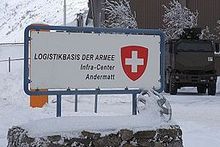Army logistics base

The Armed Forces logistics base (LBA) is an organizational unit within the Defense Department of the Federal Department of Defense, Civil Protection and Sport (DDPS).
Tasks and organization
In the LBA, the logistical services and support services within the departmental area are combined. Your area of responsibility includes supporting the Swiss Armed Forces at home and abroad. These include, among other things, the supply and return of material and systems, their maintenance, medical services for the troops, the transport of people and goods, the provision and operation of infrastructures and systems as well as cross-sectional services for the defense department.
The logistics base of the army was created on January 1st, 2004. It comprises the former Federal Office for Enterprises of the Army and the Logistics Brigade 1 .
The head of the army's logistics base has been division general Thomas Kaiser since July 1, 2015.
history
In the Old Confederation , the soldiers largely had to bring their own equipment. The cantonal authorities provided grain and salt supplies. Went on a campaign of catering, food supplies and animal feed were in the local population requisitioned and four acts . Military logistics were based on the assumption that soldiers obtain their own food. The General European Land and Sea Martial Law by Johann Gottlieb Friedrich Koch from 1778 allowed soldiers to procure (forage) feed for horses from unfamiliar fields, barns and stables.
In 1797, a war commissioner was set up in the canton of Bern to organize vehicle fleets, means of transport and horse changing stations. In 1815, the Swiss Confederation created a joint "Oberwarskommissariat" (Upper War Commissariat), while the rear services (park companies, catering depot, hospital, horse sanatorium) remained with the cantons.
During the First World War , the General Staff had not stocked up on fuel and spare parts for the 350 requisition motor vehicles. From 1918 to 1939 the number of vehicles rose from 2000 to 18000. Even during the Second World War, horses and the railroad were mainly used for transport. Deliveries by the army were made by rail to the division's transshipment point and from there they were carried to the troops in horse-drawn vehicles. The logistics infrastructure in the Alpenreduit was decentralized because the few railway lines and roads did not allow fast transport. The troops picked up their needs at the nearest logistics base and were only exceptionally supplied.
After 1945, logistics became part of overall defense (army, civil defense , war economy ). Supply bases supplied the “basic supply points” (BVP) located close to the combat units (up to 20 kilometers).
The logistics units of the Army 61 made up a third of the entire team. The combat units of Army 61 had permanently assigned operational rooms. Maintenance, repair and procurement of spare parts were the responsibility of the troops (basic and specialist workshops). A dense network of BVPs (bring principle) supplied the troops in their area of operation. The logistics were operational even in peacetime, as short advance warning times were expected. The available supplies amounted to one ton per soldier in 1978 and were housed in 5500 buildings and underground facilities (including 50 hospitals) around 100 kilometers in length. In 1969 the “sub-group logistics” was created, which belonged to the territorial service .
With the Army 95 , the number of supply places was halved (transition to the pick-up principle). The Army XXI has a mechanized, computer-aided logistics brigade with 13,000 men (bring principle).
See also
Web links
- Hervé de Weck: Logistics. In: Historical Lexicon of Switzerland .
- The bread from cake. Atomically good. An obituary for the baker general
- NZZ from January 23, 2004: Support for the troops at a lower price
Individual evidence
- ^ Website of the army logistics base
- ↑ [1] Christian Jaberg: In the normal case Holprinzip, the basic supply point (BVP) a military supermarket . ASMZ Security Switzerland. General Swiss military magazine Volume 158, Issue 10 1992
- ^ O. Meyer: Modern replenishment . The Fourier: official organ of the Swiss Fourier Association and the Association of Swiss Fourier Assistants, Volume 21, Issue 12, 1948
- ↑ Hans Schlup: The Oberkriegskommissariat (OKK) and its services for the troops . ASMZ Sicherheit Schweiz, General Swiss Military Magazine, Volume 153, Issue 9 1987.
